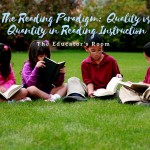 Read out loud. It’s my mantra. I don’t care how old my elementary students are, I feel they all can benefit from reading out loud to their grown ups. And in this hurried world we live in, the grown ups benefit too.
Read out loud. It’s my mantra. I don’t care how old my elementary students are, I feel they all can benefit from reading out loud to their grown ups. And in this hurried world we live in, the grown ups benefit too.
Younger readers need to read out loud to practice reading strategies, to work on pronunciation and increase comprehension. If younger students read on their own and stumble across words, they are losing valuable comprehension skills. Younger readers need to be reading under the watchful eye of a grown up in order for the grown up to be able to correct any mispronounced or skipped word, and to ask questions about what is being read.
Once reading levels increase and kids are reading longer books, they need to read out loud, continuing to have help with more difficult vocabulary and retention of characters and plot. I’ve heard many students give oral book reports where they have totally missed the meaning of the book. I attribute these mistakes to not being able to continually retain information through the length of the book or skipping over too many difficult words. Reading aloud to an adult will help with retention due to another person having to follow along and get involved in the story.
Even though older elementary kids usually read fairly well, the content of leveled books can sometimes be questionable. Many of these books deal with more adult content, can contain inappropriate language and confusing themes. As a parent I don’t like this kind of junk to be introduced into my own kids’ minds, and as a teacher I want the parents of my students to be aware of what their kids are reading. I monitor my classroom library closely, but sometimes the ‘popular’ books are purchased by families at the local bookstores or even through Scholastic where I can’t warn parents and kids of content. My suggestion is that kids ALWAYS read out loud. This way if questions about themes or content arise, parents can discuss them with their kids and be aware of what is being read. This is also a great time for kids and parents to have quality time together.
Some older elementary students may struggle with reading due to dyslexia or other processing issues. Reading out loud allows these struggling readers to benefit in the same way younger readers benefit from reading aloud.
There is definitely a place for students to read silently. I know students are not going to be able to read everything out loud all the time. However in my experience the more reading a student does out loud, the better he or she reads. Students who have been left reading on their own, especially from a young age, either end up very frustrated because they can’t decode all the words well enough to understand the storyline or they don’t see the point in reading. Reading out loud creates better silent readers and helps students see the pleasure of being able to successfully read and understand a book.
Do you require your students to read out loud?





